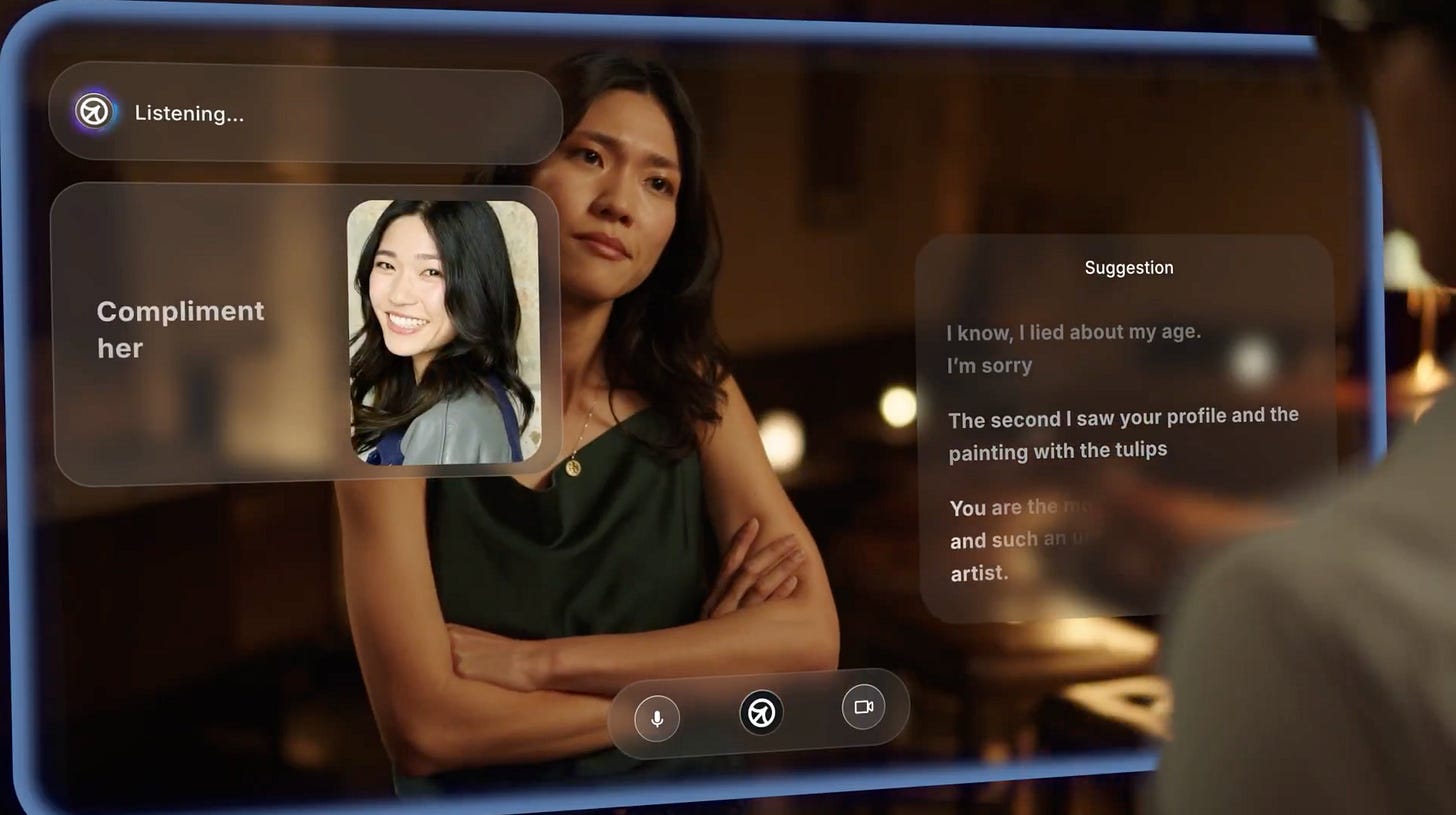Summary: Cluely, an AI startup which generated considerable buzz online with a provocative commercial, has a simple pitch: you should use AI to cheat on everything. It’s a sign of the times.
↓ Go deeper (8 min)
“Columbia student suspended over interview cheating tool raises $5.3M to ‘cheat on everything’”. This is a real headline from a TechCrunch article from last Sunday, reporting how the 21-year old Chungin Lee raised seed funding from Abstract Ventures and Susa Ventures for his AI startup, Cluely.
Along with it came a well-produced commercial — featuring Lee himself — where he leverages a hidden AI assistant in his glasses to lie on a date with a girl at a fancy restaurant.
The ad invoked an almost universally negative emotional response online. And honestly, that seemed to have been the point.
Rage baiting as a product marketing strategy
The ad was clearly meant to provoke, as the scenario in the ad, taking someone on a date and tricking them into going out with you, isn’t even a legitimate use case for the product!
If you check out the website, you’ll find is that Cluely is actually a desktop app to be used during virtual meetings. The ad was just designed to get a bunch of people arguing on the Internet about it. It’s rage bait.
Now, this is not the first time a startup launched a commercial that felt more like a Black Mirror-episode than a product ad. Remember, friend?
Generating a strong emotional response seems to be a tried-and-tested marketing strategy for AI products nowadays. And I can’t help but conclude that it works, otherwise I wouldn’t be discussing it with you.
It also reveals something about the investment environment of today. Apparently, to raise $5.3M of capital, you don’t need a product. You don’t need an existing user base. And you don’t need a workforce. Attention is all you need.
‘Cheat on everything’ is the perfect pitch
To be clear, there are currently hundreds if not thousands of startups like Cluely, who offer roughly the same application with roughly the same features. The product isn’t the story here; what they nailed is the pitch:
Sales calls. Meetings. Negotiations.
If there’s a faster way to win — we’ll take it.We built Cluely so you never have to think alone again.
It sees your screen. Hears your audio.
Feeds you answers in real time.
While others guess — you’re already right.
Cluely’s tagline, ‘cheat on everything’, perfectly encapsulates the sentiment around AI. People are constantly looking for shortcuts, whether it is because they are lazy or because management demands higher output in short timelines. It’s the virtual equivalent of het olifantenpaadje. A digital chemin de l’âne.
Now, to you, enlightened reader, the idea of having a second brain always listening in and whispering words in your ear may sound utterly dystopian, but if it were truly invisible and would go undetected, can you think of someone who would be tempted? And how would you tell?
As early as 2023, wrote about the Jagged Frontier and secret cyborgs:
All of the usual ways in which organizations try to respond new technologies don’t work well for AI. They are all far too centralized and far too slow. The IT department cannot easily build an in-house AI model, and certainly not one that competes with one of the major LLMs (and also: AI doesn’t work like software). Consultants and system integrators have no special knowledge about how to make AI work for a particular company, or even the best ways to use AI overall. The innovation groups and strategy councils inside organizations can dictate policy, but they can’t figure out how to use AI to actually get work, only the workers, experts at their own jobs, know that.
Secret cyborgs are the employees in your organization that use AI without the company or their colleagues knowing about it. The reality is this is already happening. They are present at your company, too.
This isn’t always a bad thing, but it isn’t always a good thing either. Paradoxically, at least some of value from using AI comes from people not knowing about it. Content that passes as human-written is great, but only if people think it’s coming from an actual human. A heartfelt apology means a lot less when written by ChatGPT. Cheating at an interview only works if you don’t get caught.
While startups like Cluely encourage us to see how much we can get away with, perhaps the more important question to ask ourselves is: ought we?
Yours truly,
— Jurgen
About the author
Jurgen Gravestein is a product design lead and conversation designer at Conversation Design Institute. Together with his colleagues, he has trained more than 100+ conversational AI teams globally. He’s been teaching computers how to talk since 2018.



Another load of make believe that will only serve to fatten the wallet of the grifter behind it.
It reminds me of Grammarly.
When using to write email, nobody will know how bad your grammar really is.
Is that cheating ?
Or is the core issue the fact that Grammarly doesn’t teach me to write better but instead makes me dependent and unable to develop my own writing style.